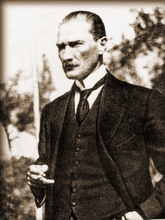So far, I like what I see. First, it's small enough to fit in my coat pocket, making it easy to keep it with me and open it up when I find a few moments alone. Second, it was cheap at $9.00. You can find it for less via the net. Third, it includes transliteration for many words.
For example, bira is Turkish for beer. The transliteration for bira is bee-ra. This little paperback covers enough words to reinforce the correct pronunciation of all the letters of the Turkish alphabet.
This phrasebook also touches on Turkish grammar. As such, it's reinforcing the grammar I've been studying via other textbooks. It's also clarifying some elements of grammar on which I've stumbled.
For example, it touches on Turkish as a case language, "which means that endings are added to nouns and pronouns to show their relationship to other elements in the sentence." Examples follow:
nominative — shows the subject of the sentence: This bag is very heavy. Bu çanta çok ağır. (literally: this bag very heavy)
accusative — shows the object of the sentence: Did you see that bag? Şu çantayı gördün mü? (literally: that bag saw-you?
genetive — shows possession ("of"): The color of this bag is very nice. Bu çantanın rengi çok güzel. (literally: this bag-of color very nice)
dative — shows the indirect object with verbs like "happen" ('to'): What happened to your bag? Çantana ne oldu? (literally: bag-your-to what happened?
locative — shows location ("in", "on", "at", "with", etc.): It's her bag. Onun çantasında. (literally: her bag-in)
ablative — shows point of origin in space or time ("from"): He pulled the timetable from the bag. Tarifeyi çantasından çıkardı. (literally: timetable bag-his-from pulled)All in all, it's an interesting, afforable complement to my other textbooks.


